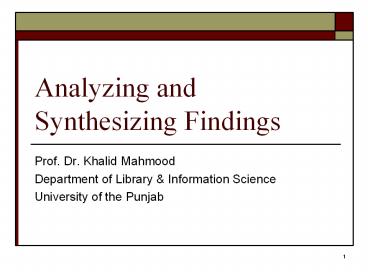Analyzing and Synthesizing Findings PowerPoint PPT Presentation
1 / 11
Title: Analyzing and Synthesizing Findings
1
Analyzing and Synthesizing Findings
- Prof. Dr. Khalid Mahmood
- Department of Library Information Science
- University of the Punjab
2
Read the articles
- completely in each topic together
- Take notes in an organized manner computer
files, note cards, etc. - Include all bibliographic info, especially page
number when quoting! - Flag like information with same color post-its
across articles.
3
Summarize
- main purpose (research questions)
- methodology
- qualitative/quantitative
- subjects, controls, treatments
- findings
- relevant details
4
Analyze
- varying definitions of key terms
- methodology used
- size generalizability of subject pool
- innovative methodology
- enough evidence?
- findings consistent with those of similar
studies?
5
Analyze
- currency lit review shows the latest work done
in subject area. (last 5 years on average) - Include older articles if
- landmark study
- only evidence on a topic
- helps explain the evolution of the research
6
Synthesize the Literature
- How does each article relate to your topic and
purpose? - Define your argument/thesis.
- Identify major trends or patterns emerging from
your reading.
7
Synthesize
- Reassemble your notes based on results of
reading, using organizational aids such as
post-its, flags, etc. - Revise original outline of categories
- Create a detailed topic outline
- begin with your argument or claim
- present evidence from articles researched that
proves your claim - Do not string together a summary of articles. The
outline is topic driven.
8
Sample topic outlinePsychological Aspects of
Organ Donation Individual and Next-of-Kin
Donation Decisions
- IV. Methodological issues and directions for
future research - A. Improvement in attitude measures and
measurement strategy. - B. Greater differentiation by type of
donation. - C. Stronger theoretical emphasis.
- D. Greater interdisciplinary focus.
- V. Summary, Conclusions, and Implications
- A. Summary of points I-IV.
- B. Need well-developed theoretical models
of attitudes and decision making. - C. Current survey data limited in scope and
application points to need for more
sophisticated research in the future. - D. Need more use of sophisticated data
analytic techniques. - E. Conclusion Psychology can draw from
various subdisciplines for an understanding of
donation decisions so intervention strategies can
be identifiable. Desperately need to increase the
available supply of donor organs.
- I. Introduction
- A. Establish importance of topic (cite
statistics on scarcity of organs). - B. Delimit the review to psychological
components of decisions. - C. Describe organization of the paper,
indicating that the remaining topics in the
outline will be discussed. - II. Individual decisions regarding posthumous
organ donation - A. Beliefs about organ donation
- B. Attitudes toward donating
- C. Stated willingness to donate
- D. Summary of research on individual
decisions - III. Next-of-kin consent decisions
- A. Beliefs about donating others organs.
- B. Attitudes toward next-of-kin donations.
- C. Summary of research on next-of-kin
consent decisions
9
Synthesize
- Note on your topic outline relationships among
studies which researchers, what page, etc.
support each point? - Note consistency of results from study to study.
- Note discrepancies among studies and provide
possible explanations such as dates of studies,
different methodologies.
10
Synthesize
- Note landmark studies and if replicated.
- Note how individual studies help illustrate or
advance theoretical notions. - Note gaps or areas needing more research.
- Make sure your detailed outline follows a logical
sequence of topics and subtopics. This will give
your literature review the coherence it needs.
11
Some problems could be
- Lacking organization and structure
- Lacking focus, unity and coherence
- Being repetitive and verbose
- Failing to cite influential papers
- Failing to keep up with recent developments
- Failing to critically evaluate cited papers
- Citing irrelevant or trivial references
- Depending too much on secondary sources

